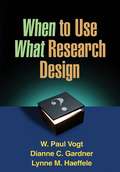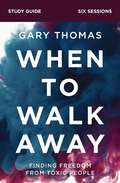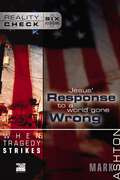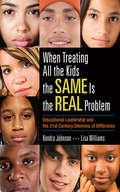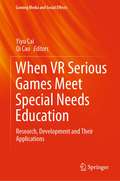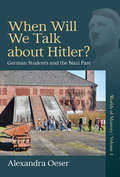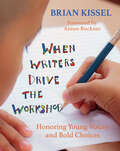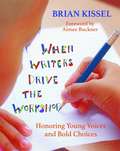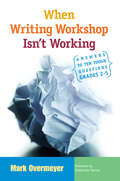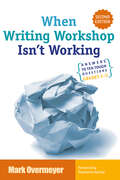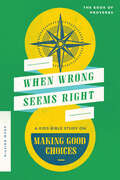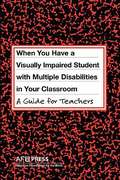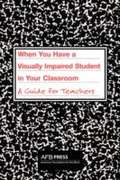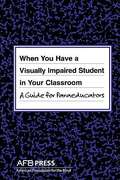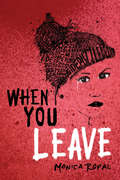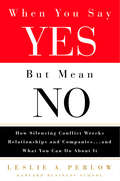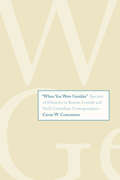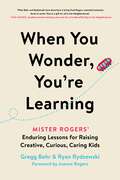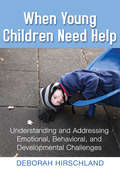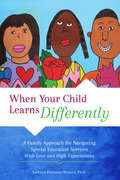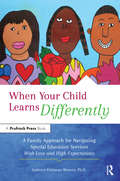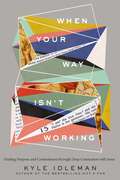- Table View
- List View
When to Use What Research Design
by W. Paul Vogt Dianne C. GardnerSystematic, practical, and accessible, this is the first book to focus on finding the most defensible design for a particular research question. Thoughtful guidelines are provided for weighing the advantages and disadvantages of various methods, including qualitative, quantitative, and mixed methods designs. The book can be read sequentially or readers can dip into chapters on specific stages of research (basic design choices, selecting and sampling participants, addressing ethical issues) or data collection methods (surveys, interviews, experiments, observations, archival studies, and combined methods). Many chapter headings and subheadings are written as questions, helping readers quickly find the answers they need to make informed choices that will affect the later analysis and interpretation of their data. Useful features include Easy-to-navigate part and chapter structure. Engaging research examples from a variety of fields. End-of-chapter tables that summarize the main points covered. Detailed suggestions for further reading at the end of each chapter. Integration of data collection, sampling, and research ethics in one volume. Comprehensive glossary.
When to Walk Away Bible Study Guide: Finding Freedom from Toxic People
by Gary ThomasIn this six-session video Bible study (DVD/streaming video not included), bestselling author Gary Thomas draws on Jesus' example to teach us how to handle difficult relationships—and to help us discern when we should walk away. As Christians, we may feel that imitating Christ's love means we must always meet the needs of unhealthy people in our lives and endure poisonous relationships. Many of us have dealt with toxic individuals who drain us of our joy and peace—who never seem to change no matter how long we wait or how hard we pray. It's a hard truth, but sometimes the best course is to distance ourselves from certain relationships and dedicate our energy elsewhere.Drawing from years of pastoral experience, Gary Thomas looks at biblical examples from the lives of Jesus, Paul, and Nehemiah to give you insightful, biblical wisdom that you can apply right away to the relationships around you. You'll discover how to:Learn the difference between difficult people and toxic people.Find refuge in God when you feel under attack.Discern when "enough is enough" and when to "wait it out."Keep a tender heart even in unhealthy relationships.Strengthen your defense and set healthy boundaries.Grow your inner strength and invest in reliable people.We can't let others steal our joy or our mission. It's time to follow Jesus' example to walk away from toxic people and walk toward healthy relationships. And as we do, it frees us to focus completely on the purpose that God has established for our lives.The When to Walk Away Study Guide includes teaching notes, discussion questions, Bible exploration, and personal study and reflection materials for in-between sessions.Designed for use with the When to Walk Away Video Study (9780310110361) available on DVD or streaming video, sold separately.
When Tragedy Strikes: Jesus' Response to a World Gone Wrong (Reality Check)
by Mark AshtonThe Reality Check series makes just one assumption: that you’re serious enough about your spiritual journey to investigate Christianity with an open mind. This isn’t about joining anyone’s religious club—it’s about being real with yourself and with the others in your group. Since no one has all the answers, there’s plenty of room for discussion. After all, if there is any truth to the Bible’s stories about Jesus, then one thing he’d welcome are questions and opinions that come from honest, earnest hearts.If there is a God and he’s good, then why doesn’t he do something about the evil and suffering in this world? Where was he when the Twin Towers fell? Where is he in the midst of your own tragedy? Questions like these are hardly academic—they’re the gut-wrenching cry of a world consumed with unendurable pain and ugliness. Something about this life is so terribly broken that only God can fix it. So why doesn’t he—or has he . . . is he . . . and will he?When Tragedy Strikes includes these sessions: Where Is God When Tragedy Strikes? Is God to Blame? How Should You Respond to Evil? Is War the Solution? What Has God Done About Evil? Will Evil Win in the Long Run?For the Group LeaderReality Check is for spiritual seekers of every persuasion. Uncompromisingly Christian in its perspective, it steers wide of pat answers and aims at honesty. This innovative and thought-provoking series will challenge you and those in your group to connect heart to heart as together you explore the interface between Jesus, the Bible, and the realities of this world in which we live.
When Treating All the Kids the SAME Is the REAL Problem: Educational Leadership and the 21st Century Dilemma of Difference
by Kendra V. Johnson Lisa N. WilliamsEmpowered solutions to close the achievement gap start here! This original, solution-oriented guide for school leaders helps to serve children of color, children from low-income families, and other marginalized student groups. Practical implementation strategies and tools assist school leaders to methodically tackle the challenges of equity-driven reform and: Understand the root cause of the racial-achievement gap Take concrete actions to transform the educational process Use daily, real-time data to determine effective teaching and learning practices Includes reflective-discussion questions and case studies. Accelerate the achievement of underserved students with this transformative book!
When Treating All the Kids the SAME Is the REAL Problem: Educational Leadership and the 21st Century Dilemma of Difference
by Lisa N. Williams Kendra V. JohnsonEmpowered solutions to close the achievement gap start here! This original, solution-oriented guide for school leaders helps to serve children of color, children from low-income families, and other marginalized student groups. Practical implementation strategies and tools assist school leaders to methodically tackle the challenges of equity-driven reform and: Understand the root cause of the racial-achievement gap Take concrete actions to transform the educational process Use daily, real-time data to determine effective teaching and learning practices Includes reflective-discussion questions and case studies. Accelerate the achievement of underserved students with this transformative book!
When VR Serious Games Meet Special Needs Education: Research, Development and Their Applications (Gaming Media and Social Effects)
by Yiyu Cai Qi CaoThis book presents selected research and development on virtual reality (VR) and serious games (SG) applications to assist children with Autism Spectrum Disorder (ASD) in their learning of different skills. Children with ASD have challenges to learn skills of learning, living, and working, due to their cognitive and behavioral limitations. The authors and their research teams of this book have many years’ research experience developing innovative and interactive VR and SG technology for the special needs education. More specifically, several VR serious games are designed to train children with ASD on learning skill, life skill, and job skill. Such games are often developed based on the needs of special education and used by special needs schools in Singapore. This book is a useful resource for students, scholars, and designers of learning material who want to embrace VR and SG for children with ASD.
When Will We Talk About Hitler?: German Students and the Nazi Past (Worlds of Memory #1)
by Alexandra OeserFor more than half a century, discourses on the Nazi past have powerfully shaped German social and cultural policy. Specifically, an institutional determination not to forget has expressed a “duty of remembrance” through commemorative activities and educational curricula. But as the horrors of the Third Reich retreat ever further from living memory, what do new generations of Germans actually think about this past? Combining observation, interviews, and archival research, this book provides a rich survey of the perspectives and experiences of German adolescents from diverse backgrounds, revealing the extent to which social, economic, and cultural factors have conditioned how they view representations of Germany’s complex history.
When Writers Drive the Workshop: Honoring Young Voices and Bold Choices
by Brian KisselWith increasing school mandates and pressure to perform well on standardized tests, writing instruction has shifted to more accountability, taking the focus away from the writer. In his engaging book, When Writers Drive the Workshop: Honoring Young Voices and Bold Choices , author Brian Kissel asks teachers to go back to the roots of the writing workshop and let the students lead the conference. What happens when students, not tests, determine what they learned through reflection and self-evaluation?In When Writers Drive the Workshop, you'll find practical ideas, guiding beliefs, FAQs, and Digital Diversions to help visualize digital possibilities in the classroom. Written in an engaging, teacher-to-teacher style, this book focuses on four key components of writing workshop: Student-led conferring sessions where the teachers are the listenersThe Author's Chair-, where students set the agenda and gather feedbackStructured reflection time for students to set goals and expectations for themselvesMini lessons that allow for detours based on students' needs, not teacher or curricula goalsAll students have the powerful, shared need to be heard; when they choose their writing topics, they can see their lives unfold on the page. Teachers are educated by the bold choices of these young voices.
When Writers Drive The Workshop: Honoring Young Voices And Bold Choices
by Brian KisselIn this practical, engaging book, former elementary school teacher and university professor Brian Kissel asks teachers to go back to the roots of writing workshop. What happens when students, not planned teaching points, lead writing conferences? What happens when students, not tests, determine what they learned through reflection and self-evaluation? Writing instruction has shifted in recent years to more accountability, taking the focus away from the writer. This book explores what happens when empowered writers direct the writing workshop. Through stories from real classrooms, Brian reveals that no matter where children come from, they all have the powerful, shared need to be heard. And when children choose their writing topics, their lives unfold onto the page and teachers are educated by the young voices and bold choices of these writers. Written in an engaging, teacher-to-teacher style, this book focuses on four key components of writing workshop, with an eye on what happens when teachers step back and allow students to drive the instruction: Conferring sessions where students lead and teachers listen Author's Chair where students set the agenda and ask for feedback Reflection time and structures for students to set goals and expectations for themselves Mini-lessons that allow for detours based on students' needs, not teacher or curricular goals Each of the chapters includes practical ideas, a section of Guiding Beliefs, a list of Frequently Asked Questions, and some Digital Diversions to help teachers see the digital possibilities in their classrooms.
When Writing Workshop Isn't Working: Answers to Ten Tough Questions, Grades 2-5
by Mark OvermeyerWriting is hard work. Teaching it can be even harder. As most teachers know, writer's workshop doesn't always go as planned, and many find there are obstacles that they consistently struggle with. In his role as a literacy coordinator and teacher, Mark Overmeyer has heard the same issues raised again and again by both new and experienced colleagues. When Writing Workshop Isn't Working: Answers to Ten Tough Questions, Grades 2-5 provides practical advice to overcome these common problems and get your writing workshop back on track. Acknowledging the process-based nature of the writing workshop, this book does not offer formulaic, program-based, one-size-fits all answers, but presents multiple suggestions based on what works in real classrooms. The ten key questions this book addresses include: How do I help students who don't know what to write about? How do I help students develop stronger vocabulary and word choice? How do I prepare my students for standardized tests without compromising my writing program? How should I assess student writing? How can I help my students use revision effectively? This book is a handy reference tool for answering specific questions as they pop up during the year. Overmeyer uses student examples throughout to help teachers envision these solutions in their own classes, and he includes an array of classroom-tested ideas for helping primary and intermediate English language learners. There may not be any easy answers to the complexities of writer's workshop, but by identifying and providing advice on the most common stumbling blocks one encounters, When Writing Workshop Isn't Working provides a solid groundwork—freeing up time and creativity for teachers to address the specific needs of their students.
When Writing Workshop Isn't Working: Answers to Ten Tough Questions Grades 2-5
by Mark OvermeyerWriting is hard work. Teaching it can be even harder. As most teachers know, writer's workshop doesn't always go as planned, and many find there are obstacles that they consistently struggle with. In his role as a literacy coordinator and teacher, Mark Overmeyer has heard the same issues raised again and again by both new and experienced colleagues.When Writing Workshop Isn't Working: Answers to Ten Tough Questions, Grades 2–5 provides practical advice to overcome these common problems and get your writing workshop back on track. Acknowledging the process-based nature of the writing workshop, this book does not offer formulaic, program-based, one-size-fits-all answers, but presents multiple suggestions based on what works in real classrooms. This second edition includes updated ideas for common issues in the workshop and features new chapters on technology and resistant writers. Questions addressed in the new edition include: · How can I reach resistant writers?· How can I support students in their use of technology, including AI?· How should I assess student writing?· How do I manage writing conferences?· How can I help my students revise and self-edit? This book is a handy reference tool for answering specific questions as they pop up during the year. Overmeyer uses student examples throughout to help teachers envision these solutions in their own classes, and he includes an array of classroom-tested ideas for multilingual learners. There may not be any easy answers to the complexities of writer's workshop, but by identifying and providing advice on common stumbling blocks, the second edition of When Writing Workshop Isn't Working provides a solid groundwork—freeing up time and creativity for teachers to address the specific needs of their students.
When Wrong Seems Right: A Kids Bible Study on Making Good Choices
by Adam GriffinHelping kids fall in love with God and His Word as they study the Bible for themselves.Is that right? A heart guide for discerning wrong from right.Our kids are growing up in a confusing world with an abundance of messages that are contrary to God&’s word. This Bible study takes your kids through forty Proverbs, providing wisdom for right thinking and living. Proverbs is a great place to start for kids who are studying the Bible on their own for the first time or who are trying to find a rhythm for regular Bible study. With straightforward easy-to-understand lessons, your kids will learn how to study their Bibles and how to apply it. They will discover what it looks like to follow Christ in a world that doesn&’t. As your kids study the Proverbs, they will find that even when they make wrong choices, God is kind to forgive and set them on the right path. And, most importantly, they will receive the necessary help to follow the fount of all wisdom: Jesus.When Wrong Seems Right emboldens your kids in God&’s truth so they can grow into a courageous generation of wise young men and women!
When You Have a Student with Visual and Multiple Disabilities in Your Classroom: A Guide for Teachers
by Jane N. Erin Susan J. SpunginAs a special educator, a classroom teacher, or an educational team member, you may be working with a visually impaired student for the first time or as an experienced professional. This booklet provides information on how visual impairment affects learning in communication, movement, self-care skills, and other important areas, and on how to work effectively with students who have visual and other disabilities.
When You Have a Visually Impaired Student in Your Classroom: A Guide for Teachers
by Donna Mcnear Iris TorresA reliable and easy-to-use resource for general education classroom teachers working with students who are blind or visually impaired, this guide provides information on students abilities and needs, resources and educational team members, special education requirements, the expanded core curriculum, and technology used by students. It is essential reading for general education teachers with visually impaired students, school administrators, school nurses, paraeducators, related personnel, and parents.
When You Have a Visually Impaired Student in Your Classroom: A Guide for Paraeducators
by Joanne Russotti Rona Shaw Susan Jay SpunginThis guide defines the paraeducator's role and how they work with other education team members. Subjects covered in the book include basics of visual impairment, tips for encouraging student growth and the special material and devices needed by the student. Forms are also included to help organize information and track progress.
When You Just Have to Roar!
by Priscilla Prentice Rachel RobertsonIt's one of those days in Ms. Mya's classroom, when things just aren't clicking: Jamilla is jumping. Ruth is running. And Reese is roaring like a great big lion for no reason at all. But Ms. Mya knows what to do. She gathers up the children, and together they begin a conversation about expectations. "An expectation is something we can rely on, something we know is going to happen," says Ms. Mya. When adults guide children in a positive, proactive way by supplying them with clear expectations of what to do, when to do it, and how to behave, children learn to focus, direct their attention, manage their emotions, and regulate their behavior. A charming story coupled with equally as charming illustrations, When You Just Have to Roar! helps children and the adults who care for them make every day its best.The book contains a page of information to help parents, caregivers, and educators reinforce these important concepts and support children's development of emotional control and self-regulation.Rachel Robertson is the director of education and development at Bright Horizons. She has more than twenty years of experience in the education field and is the author of numerous early childhood resources. This is her first children's book.Priscilla Prentice studied illustration at the Rhode Island School of Design. Upon graduation she worked as an animator and eventually settled as an environmental artist for video games. When You Just Have to Roar! is her picture book debut.
When You Leave
by Monica RopalCass is positive that the people she cares about most will eventually leave her. Her father is gone, her mother doesn’t notice Cass exists, and her best friend’s battle with cancer was too close of a call. So when she begins her year at a wealthy new private school, Cass’s plan is to suffer through it in anonymity. However, when her cute locker neighbor, Cooper, shows an undeniable attraction toward Cass, keeping him at a safe distance isn’t easy. Even though her Frogtown skater world and his do-gooder preppy one are so different, Cass and Cooper somehow mesh. But once Cass lets her guard down, the unthinkable happens: Cooper is mysteriously murdered--thus proving her original theory. When Cass’s close friend is suspected as the killer, she isn’t sure who she can trust anymore. Between investigating Cooper’s murder and trying to understand what they really meant to each other, will Cass even find what she is looking for?
When You Never Said Goodbye: A Novel in Poems and Journal Entries
by Meg KearneyAgainst the odds, eighteen-year-old Liz McLane, adoptee and aspiring poet, searches for her birth mother in this sensitive and daring novel told through her own accessible and moving poems and journal entries. A student at NYU in Greenwich Village, Liz McLane is pursuing her dream of becoming a poet and, at the same time, determined to find her birth mother, no matter what the results may be. Through her journals, Liz records her struggle to navigate adoption bureaucracy and laws. In spare and poignant poems, she confides her fears and her prayers. Could her birth mother be the unknown guitarist in Washington Square Park, who sings a soulful song in a strangely familiar voice? Against a backdrop of college life—classes on Alice Munro and Billy Collins and an active social life—and with the help of her sister, friends, and a private investigator, Liz summons the courage to face the truth about her mother and herself. This is an unforgettable novel full of heart that addresses the primary questions all adoptees must answer for themselves: who was the woman who gave me life, and why did she decide to give me away? Based on author Meg Kearney’s own experiences.
When You Say Yes But Mean No: How Silencing Conflict Wrecks Relationships and Companies... and What You Can Do About It
by Leslie PerlowWe live in a culture—especially at work—that prefers harmony over discord, agreement over dissent, speed over deliberation. We often smile and nod to each other even though deep down we could not disagree more. Whether with colleagues, friends, or family members, the tendency to paper over differences rather than confront them is extremely common. We believe that the best thing to do to preserve our relationships and to ensure that our work gets done as expeditiously as possible is to silence conflict. Let’s face it, most bosses don’t encourage us to share our differences. Indeed, many people are taught that loyal employees accept corporate values, policies, and decisions—never challenging or questioning them. If we want to hold on to our jobs and move up in our organizations, stifling conflict is the safest way to do it—or so we believe.And it is not just with our bosses that we fear raising a dissenting opinion. We worry about what our peers and even our subordinates may think of us. We don’t want to embarrass ourselves or create a bad impression. We don’t want to lose others’ respect or risk rejection.We often associate conflict with its negative form—petty bickering, heated arguing, a bloody fight. But conflict can also be a source of creative energy; when handled constructively by both parties, differences can lead to a healthy and fruitful collaboration, creation, or construction of new knowledge or solutions. When we silence conflict, we avoid the possibility of negative conflict, but we also miss the potential for constructive conflict.Worse yet, as Leslie Perlow documents, the act of silencing conflict may create the consequences we most dread. Tasks frequently take longer or never get done successfully, and silencing conflict over important issues with people for whom we care deeply can result in disrespect for, and devaluing of, those same people. Each time we silence conflict, we create an environment in which we’re all the more likely to be silent next time. We get caught in a vicious “silent spiral,” making the relationship progressively less safe, less satisfying, and less productive. Differences get glossed over, patched over, and suppressed . . . until disaster happens. “Saying yes when you really mean no” is a problem that haunts organizations from start-ups to multi-nationals. It exists across industries, levels, and functions. And it’s exacerbated by a down economy, when the fear of losing one’s job is on everybody’s mind and the idea of allowing conflict to surface or disagreeing with others seems particularly risky. All too often, the conversation at work bespeaks harmony and togetherness, even though passionate disagreements exist beneath the surface. Leslie A. Perlow is a corporate ethnographer, an anthropologist of corporate culture. Anthropologists like Margaret Mead spend years in the field studying exotic cultures. Perlow does the same, although the field for her is the office and the exotic people are us—those who work in the world of organizations. But the end result is no less surprising or rich in insight. Whether it’s a Fortune 500 firm, small business, or government bureaucracy, Perlow provides a keen understanding of the hidden issues behind what people say (and don’t say). And more important, she shows how to create relationships where individuals feel empowered to express their genuine thoughts and feelings and to harness the power of positive conflict.
"When You Were Gentiles"
by Cavan W ConcannonCavan W. Concannon makes a significant contribution to Pauline studies by imagining the responses of the Corinthians to Paul's letters. Based on surviving written materials and archaeological research, this book offers a textured portrait of the ancient Corinthians with whom Paul conversed, argued, debated, and partnered, focusing on issues of ethnicity, civic identity, politics, and empire. In doing so, the author provides readers a unique opportunity to assess anew, and imagine possibilities beyond, Paul's complicated legacy in shaping Western notions of race, ethnicity, and religion.
When You Wonder, You're Learning: Mister Rogers' Enduring Lessons for Raising Creative, Curious, Caring Kids
by Ryan Rydzewski Gregg BehrBringing the lessons of Mister Rogers into the digital age Playful and practical, When You Wonder, You're Learning introduces a new generation of families to the lessons of Mister Rogers' Neighborhood. By exploring the science behind the iconic television program, the book reveals what Fred Rogers called the &“tools for learning&”: skills and mindsets that scientists now consider essential. These tools—curiosity, creativity, collaboration, and more—have been shown to boost everything from academic learning to children&’s well-being, and they benefit kids of every background and age. They cost next to nothing to develop, and they hinge on the very things that make life worthwhile: self-acceptance; close, loving relationships; and a deep regard for one&’s neighbor. When You Wonder, You're Learning shows parents and educators the many ways they might follow in Rogers&’ footsteps, sharing his &“tools for learning&” with digital-age kids. With insights from thinkers, scientists, and teachers—many of whom worked with Rogers himself—the book is an essential exploration into how kids and their parents can excel at what Rogers taught best: being human.
When Young Children Need Help
by Deborah HirschlandLearn how to reach children who need special help.Almost anyone who works with 3- to 6-year-olds knows what it feels like to spend time with youngsters who are particularly puzzling or hard to help. When Young Children Need Help examines how early childhood educators can make sense of what is going on for such children and then use that understanding to help promote growth and mastery. Written for child care center staff, family child care providers, preschool teachers, and pre-service teachers, this book can be useful to any adult who wants to learn more about reaching the most troubling children in his or her care.When Young Children Need Help provides a framework for understanding a range of emotional, behavioral, and developmental challenges. It explores a process through which early childhood teachers and providers can translate their growing understanding of a child's difficulties into sensible goals for intervention. The author lays out practical strategies that help kids connect and communicate with ease, focus their attention, manage their bodies and their feelings, engage in constructive problem-solving, and experience themselves as successful friends and learners. The book suggests approaches for collaborating with parents and other caregivers and emphasizes that even when a child needs outside services and supports, what goes on in school or care remains central to making progress.Ranging from the classroom to the playground and back again, When Young Children Need Help offers its perspectives and strategies through highly engaging stories that bring challenging kids alive in all their quirky uniqueness.
When Your Child Learns Differently: A Family Approach for Navigating Special Education Services With Love and High Expectations
by Kathryn Fishman-WeaverAdvocating for a child who learns differently can sometimes feel like an isolating and daunting task. This book reminds families that they are not alone. When Your Child Learns Differently is a compassionate guide that:Helps families navigate special education services from the inside out.Offers targeted advice to families of children with a wide range of disabilities and challenges.Shares valuable information about special education language, policy, procedures, and supports.Reminds families that they are the most important advocates in their child's success plan.Draws on the author's experiences as both a parent and special education teacher.Accessible and encouraging, this guide humanizes the journey of caring for children who learn differently. Readers will leave the book empowered with practical policy knowledge and energized by the belief that, with love and high expectations, almost anything is possible.
When Your Child Learns Differently: A Family Approach for Navigating Special Education Services With Love and High Expectations
by Kathryn Fishman-WeaverAdvocating for a child who learns differently can sometimes feel like an isolating and daunting task. This book reminds families that they are not alone. When Your Child Learns Differently is a compassionate guide that:
When Your Way Isn't Working: Finding Purpose and Contentment through Deep Connection with Jesus
by Kyle IdlemanWhen you are worn-out, when you feel discouraged, when you think you don't have what it takes, what is the one thing that Jesus wants you to never forget? When Your Way Isn't Working equips you to discover authentic connection to God and others so you are free to live the life you long for.In some of his final words to his closest friends, Jesus didn't suggest a five-year plan for success or a checklist of things to do. Instead, he offered a metaphor about what the good life really looks like: I am the vine. You are the branches. Abide in me. In other words, No matter what happens next, the most important thing is to stay connected to me.In When Your Way Isn't Working, pastor and bestselling author Kyle Idleman offers a unique exploration of John 15 for all of us who are going through the motions and feel frustrated. Idleman reminds us that it's connection, not production, that leads to a fruitful life--relationships, not circumstances, that bring joy. He offers his distinctive, biblical perspective on how to:Find greater rest, depth, and connection in your lifeEmbrace freedom from the pressures of performance and productionRecognize what you can't do makes room for what God can doStep out of isolation even when it feels scaryDiscover the top distractions that keep you from connecting to God--and how to counter them In the end, the fruit of your life won't have to do with what you accomplished but with whom you stayed connected. Because no matter what happens next in this uncertain world, what matters most, lasts the longest, and brings the greatest joy is staying connected to the God who never leaves you.
